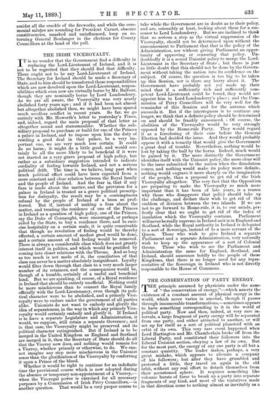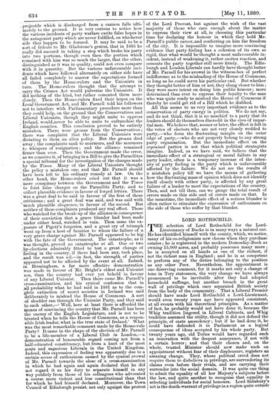THE CONSERVATION OF PARTY ENERGY.
rrilprinciple assumed by physicists under the name f "the conservation of energy,"—which asserts the existence of a constant amount of physical energy in the world, which never varies in amount, though it passes through innumerable transformations,—sometimes appears to have something corresponding to it in the world of political party. Now and then, indeed, at very rare in- tervals, a large fragment of party energy will be separated from one party, and either attracted to another, or will set up for itself as a sort of political planetoid with an orbit of its own. This very rare event happened when Lord Hartington and Mr. Chamberlain broke off from the Liberal Party, and constituted their followers into the Liberal Unionist section, obeying a law of its own. But for the most part, the energy of any one party is all but a constant quantity. The leader makes, perhaps, a very great mistake, which appears to alienate a company of his followers ; but after they have grumbled and protested a little, they travel on again in the old orbit, without any real effort to detach themselves from their accustomed sphere. It requires something like volcanic bursts of force to break up a party into separate fragments of any kind, and. most of the tentatives made in that direction come to nothing almost as inevitably as a .projectile which is discharged from a cannon fails ulti- mately to the ground. It is very curious to notice how • the various incidents of party warfare excite false hopes in the antagonist party which are never fulfilled, on whichever side they happen to be formed. It may be said to be a sort of tribute to Mr. Gladstone's genius, that in 1885 he really did succeed in taking a step which broke his party • into two portions, though even then the portion which remained with him was so much the larger, that the other, distinguished as it was in quality, could not even compare with it in quantity. But the various unfavourable inci- dents which have followed alternately on either side have all failed completely to answer the expectations formed . of them by the Home-rulers and the Unionists in • turn. The Home-rulers thought that the attempt to • carry the Crimes Act would pulverise the Unionists. It did nothing of the kind, but rather cemented them more closely. Then the Home-rulers fixed their hopes on the Local Government Act, and Mr. Parnell told his followers not to interfere with Parliamentary procedure more than they could help, on the ground that the Conservatives and , Liberal Unionists, though they might unite to oppress Ireland, would.never be able to unite to enfranchise the , English counties. This conclusion proved to be entirely mistaken. There were groans from the Conservatives ; there was complaint that the Liberal Unionists were dictating to them an alien policy. But the groans died , away ; the complaints sank to murmurs, and the murmurs to whispers of resignation ; and the alliance remained , firmer than ever. Then the Government made the error, , as we conceive it, of bringing in a Bill to give the Parnellites a special tribunal for the investigation of the charges made , by the Times. Many of the Liberal Unionists thought , the policy a mistaken one, and that Mr. Parnell should have been left to his ordinary remedy at law. On the other hand, the Home-rulers cried out that it was a , mere conspiracy between the Government and the Times to foist false charges on the Parnellite Party, and to , collect plausible evidence in favour of forged letters. There , was a great deal to be said in favour of the first of these ,criticisms ; and a great deal was said, and was said with much plausible eloquence, in favour of the second. But _ neither of these complaints produced any real effect. Those who watched for the break-up of the alliance in consequence of their conviction that a grave blunder had been made , under either head, watched in vain. Then came the ex- ,posure of Pigott's forgeries, and a great cry of triumph went up from a host of fanatics to whom the failure of a very grave charge against Mr. Parnell appeared to be big with the fate of the Government. The catastrophe, as it was thought, proved no catastrophe at all. One or two ,by-elections admirably fitted to test a great change of feeling in the country, if there had been any, took place, and the result was nil,—in fact, the strength of parties appeared not to be affected by the event at all. Indeed, iri Birmingham, a far more effective demonstration was made in favour of Mr. Bright's eldest and Unionist son, than the country had ever yet beheld in favour of any Liberal Unionist. Then there came Mr. Parnell's cross-examination, and his cynical confession that in ll.probability what he had said in 1881 as to the com- 4.ete extinction of secret societies in Ireland was said deliberately to mislead the House of Commons. A sort of shudder ran through the Unionist Party, and they said tie each other,—` Well, here at least there is afforded the means of convincing the country that M. Parnell has been the enemy of the English Legislature, and is not to be trusted when he tells the House of Commons, as a respon- sible Irish leader, what is the true state of Ireland.' What was the most remarkable comment made by the Home-rule party? It came in the shape of the election of Mr. Parnell to be a life-member of a Liberal Club in London,—a demonstration of honourable regard coming not from a half-educated. constituency, but from a knot of the most • txtv and sagacious Liberals in the United Kingdom. Indeed, this expression of feeling was apparently due to a certain access of enthusiasm caused by the cynical avowal of Mr. Parnell towards the elose of a cross-examination iii which he had again and again declared that he did not regard it as his duty to separate himself in any way publicly from those of his colleagues who advocated a course more violent and less constitutional than that ter which he had himself declared. Moreover, the Town Council of Edinburgh persist, not only against the protest of the Lord Provost, but against the wish of the vast majority of those who care enough about the matter to express their view at all, in choosing this particular time for declaring the honour in which they hold Mr. Parnell's public career, and conferring on him the freedom of the city. It is impossible to imagine more convincing evidence that party feeling has a cohesion of its own so rigid, that what would be thought a most unfavourable in- cident, instead of weakening it, rather excites reaction, and cements the party together still more firmly. The Edin- burgh and London Liberals can hardly have thought better of Mr. Parnell for his avowal in the witness-box of perfect indifference as to the misleading of the House of Commons, so long as he could serve his particular end. But whether they thought better of him or not, they clung closer to him ; they were more intent on doing him public honour ; more determined than ever to express their loyalty to the man who was quite ready to mislead the House of Commons if thereby he could get rid of a Bill which he disliked.
All this seems to us very important evidence as to the conservation of party energy in politics. We do not say, and do not think, that it is no mischief to a party that its leaders should do themselves discredit in the eyes of impar- tial men. We believe that, sooner or later, the effect is felt in the votes of electors who are not very closely wedded to party,—who form the fluctuating margin on the outer edge of party,—who do not properly belong to any strong party organisation. But the immediate effect on the organised parties is not that which political strategists imagine. Indeed, as we have said, we believe that the immediate effect of a strategical or moral failure in any party leader, often is a temporary increase of the inten- sity of party feeling in the party which is unfavourably affected by the failure. We do not see the results of a mistaken policy till we have the means of gathering how the fluctuating mass of opinion which does not identify itself closely with either party, is affected by any great failure of a leader to meet the expectations of the country. Then, and not till then, can we gauge the total result of errors made on this side and of errors made on that. In the meantime, the immediate effect of a serious blunder is often rather to stimulate the expression of enthusiasm on the side of those who suffer by that blunder.







































 Previous page
Previous page